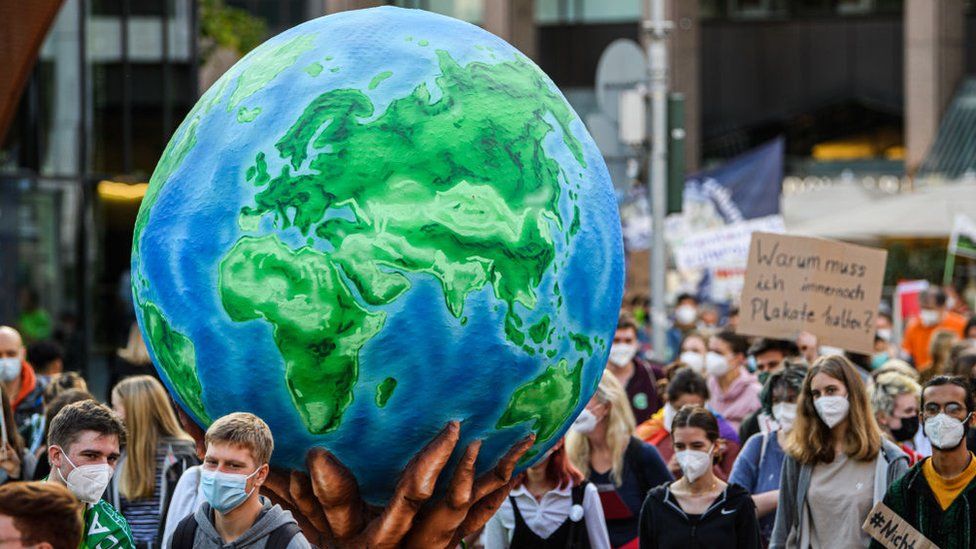By Katya Mavrelli,
Leaders, activists, NGO representatives and plain citizens have gathered in Glasgow, Scotland, in light of the United Nations Conference of the Parties (COP26) to discuss climate change and the looming climate crisis. Many regard this as “the last best chance” that the world has to address this issue before it is too late, and before there is irreversible damage.
In this 12-day event, leaders are expected to come up with meaningful ways to enable the transition from fossil fuels to greener technologies, to set goals that will prevent the deviation of the temperature curve away from 2 degrees, and even make it approach 1.5 degrees, to align economies to enhance coordination and cooperation, and to ensure the survival of smaller communities and natural habitats.
However, the spotlight once more falls on the MENA region (Middle East and North Africa), due to the vital role that fossil fuels play in the sustenance of the regional economies. Oil has been the lifeline of most of the Gulf economies, primarily Saudi Arabia, the United Arab Emirates, and Qatar, whose economies revolve around the primacy of oil and whose political decisions are taken always mindful of their implication on the oil industry.
What should be the key outcomes from the COP26 Summit, therefore, for the MENA region?
Some of the world’s largest hydrocarbon producers have highlighted the importance of going net-zero, meaning that some sectors will emit more while others emit significantly less in order to meet the required goal of internationally agreed-upon emissions. In order to go net-zero, sound business and economic models have to be developed – it isn’t a decision that can be taken one day to the next, without considering the implications this decision will have on the political, social, and primarily economic sector. For the MENA “oil titans”, the expansion of existing abilities to use other technologies and expand the potential of greener technologies will be the key in this process. The MENA will have to improve its capacity to address public needs and provide services, like electricity, and better direct –or re-direct– investments towards covering such needs.

What is more, COP26 should lead to better integration of developing countries and smaller communities in the international decision-making sector. Climate change affects everyone, but some communities will face graver implications than others. For example, this is the case of island nations, which will have to face an increased risk of losing coastal areas to land degradation and salinification. Apart from smaller states, developing countries that depend on fossil fuels, and whose economies are in the process of a green transformation, should also be better supported, as is the case for the Middle East and the Gulf States. The COP26 Summit needs to devise a plan of funding allocation for developing and smaller countries, in order to allow them to finance their development processes and allow them to prioritize this transition. Funding may not be a challenge for all MENA states, given that their oil supremacy has allowed them to develop a strong and stable economy, as is true for Saudi Arabia, but other smaller states might be in need of greater support in this process.
COP26 should also place greater emphasis on substantial solutions, like making renewable energy products more cost-efficient over the years, instead of deciphering the politics of actions. The absence of major international players and emitters, like China and Russia, from the summit was noted by everyone. Their participation was regarded as necessary, and equally vital, for the better cooperation, coordination, and aligning of national economies. However, the politicization of the attendance, or absence, of nations from the summit deviates from its actual aim. While the scope of the summit is a coordinative one, aiming for the better organization of states around a common goal, the absence of some shouldn’t be an excuse for the rest to fail to meet their goals. It is true that an issue as critical as climate change has implications for all, irrespective of geographical location or economic advancement, and thus the organization of national political agendas should happen around internationally determined standards. However, the coordination of some is better than the deviation of all.
COP26 is the first official meeting, in which international leaders will report on their successes and failures in protecting the environment, and taking steps to address the climate crisis. Expectations are high and all the spotlight has fallen on bigger states, that will make generous commitments that may sometimes exceed their ability to meet them, on smaller states, which will try to defend and secure their position on the global map, and on developing nations, which are on their path towards associating their economies with greener forms of energy. Only by coordinating, without turning this cooperation into invasive political decision-making, will we achieve real change.
References
- What is COP26 and why is it so important?, euronews, Available here
- Experts react: Live updates from COP26 as world leaders scramble to save the planet, atlanticcouncil, Available here
- Mirette F. Mabrouk, Karen E.Young, Jessica Obeid, Malak Altaeb, Intissar Fakir, What should be the key outcomes from COP26?, mei, Available here




